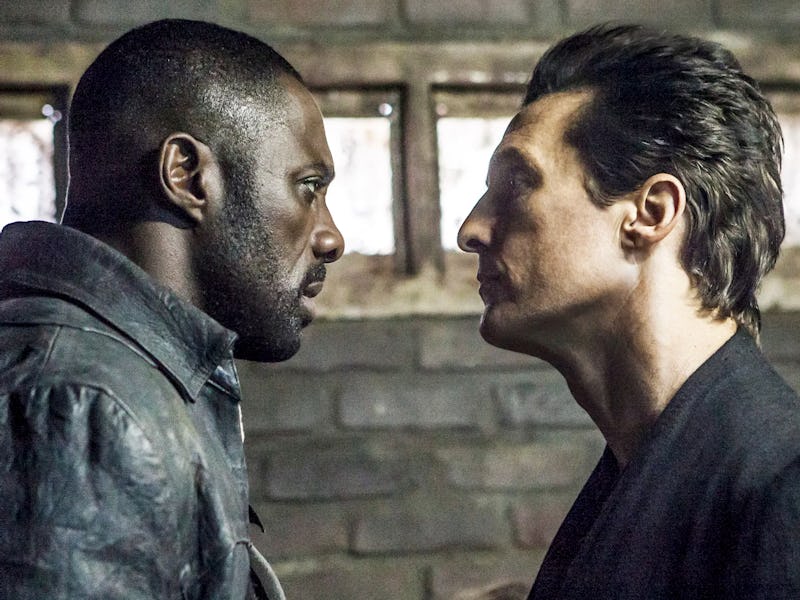5 years ago, Stephen King's most disappointing sci-fi movie failed to launch a franchise
Dark Tower deserved better — and longer — than this.

In an age when every blockbuster comes with a bum-numbing runtime and a show about the making of The Godfather runs three times longer than the film itself, it’s rare to watch something which proves the concept of the editing suite hasn’t become entirely obsolete. Unfortunately, by condensing 4,250 pages of dense Stephen King mythology into just 95 muddled minutes, The Dark Tower’s team went a little too scissor-happy.
“A limp, barely coherent shell of a movie,” was one of the kinder reviews that greeted the 2017 release, which, despite dislodging Dunkirk from the top of the box office chart, failed to recoup its $66 million budget domestically. Considering its years stuck in development hell, the fact it even made it into cinemas at all was something of an achievement.
King’s sprawling sci-fi fantasy-Western series had been first optioned for the screen in 2007 by longtime admirers Damon Lindelof and Carlton Cuse: Showing their fanboy credentials, they paid just $19 in honor of the number that repeatedly crops up in the novels as a motif. But alongside potential director J.J. Abrams, their commitments to Lost — another quasi-philosophical saga that struggled to untie all its knots — and unhelpful reverence to the source material put pay to any ambitions of even one adaptation, let alone a proposed seven.
Idris Elba actually gets to do something.
Ron Howard was the unlikely next name to pick up the mantle in 2010. He also took it much further, casting Javier Bardem as brooding hero Roland for what was planned as an action-oriented film trilogy and two more character-driven TV series. On this occasion, it was financial constraints that turned out to be the stumbling block, with Universal, Warner Bros., and HBO all getting cold feet about committing to such a wildly ambitious projects.
Things didn’t run much smoother even when Sony Pictures Entertainment finally managed to get The Dark Tower into production. Nikolaj Arcel, a slightly leftfield choice for director considering his last effort was Oscar-nominated Danish historical drama A Royal Affair, was nearly given his marching orders following disastrous test screenings. And there was a questionable uproar from certain fans over the news Roland wasn’t going to be played by a young Clint Eastwood lookalike but Black British actor Idris Elba.
The latter’s performance is actually one of the film’s few saving graces. Despite having to avenge the murder of his father, take a young psychic under his wing, and essentially stop the portal to Hell from opening up, Elba’s gunslinger isn’t actually given that much to do. However, the Luther star still displays stoicism, magnetism, and strong comic timing — see the real-world hospital scene where Roland has to keep his identity under wraps — which leaves you wishing the umpteenth script rewrite had, like the book, told the story from his perspective.
Matthew McConaughey in lounge lizard mode.
Yes, as if eradicating key characters (Susannah and Eddie are notably absent) and skimming through eight novels and a short story wasn’t enough, The Dark Tower also turns its sprawling source material into a generic five-years-too-late YA movie.
Making his cinematic debut, Tom Taylor acquits himself well as the troubled real-world teen who enters a portal into the same post-apocalyptic land he’s had disturbing visions of. But even Howard, who stayed on board as producer, acknowledged that retooling a dark adult horror into a PG-13 boy’s adventure was a misfire. By having to overcome the death of his father, and later his mother and wicked stepfather, the surly Jake spends most of the film in an understandably perplexed daze. Like everything else, the bond he builds with Roland is too rushed to make any emotional impact.
Perhaps we should be thankful that at least the villain wasn’t the focus. In King’s books, The Man in Black is pure evil personified. This is someone who not only traffics psychic kids to Mid-World from their New York homes but then — in a bid to harness their “Shine” for nefarious purposes — literally catapults them into the titular structure. In the film, however, Matthew McConaughey plays him with the subtlety of a pantomime baddie. He might be able to kill anyone he chooses simply by waving his hands. Yet the most unsettling thing about him is his copious amounts of hair gel.
It’s never made clear why Walter is so hellbent on destroying the Tower that keeps various Lovecraftian monsters at bay, either. Then again, there’s little made clear about anything. Arcel and screenwriter Akiva Goldsman (who’s also since admitted he dropped the ball) express little interest in the basics of storytelling. They simply want to get from A to B as quickly and as workmanlike as possible.
Yeah, Tom Taylor’s Jake always looks this perplexed.
The Dark Tower doesn’t even work as a visual spectacle. There’s a half-decent fright when a vision of Jake’s father suddenly transforms into a wild-eyed demon. The majority of the dodgy CGI sequences, though, are as incomprehensible as the narrative, while the climactic gunfight is more arcade game shoot-’em-up than Sergio Leone-style showdown.
Why a story with such obvious franchise-starting potential was given the rushed CliffsNotes treatment remains truly baffling, particularly when, with Jake’s agreement to follow Roland back to Mid-World, a sequel was blatantly being lined up. That, of course, never materialized, with Amazon also balking at the chance to adapt it for television, a place which everyone involved appears to believe should always have been its natural home. In the same year It staked a claim as the best Stephen King adaptation of the streaming age, The Dark Tower found itself, completely avoidably, as the nadir.